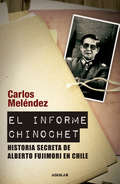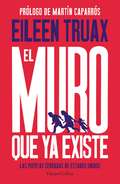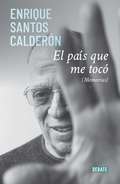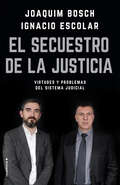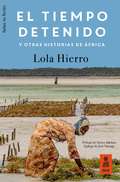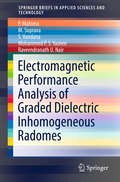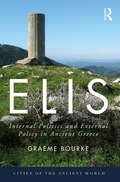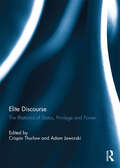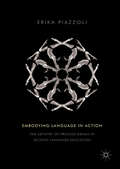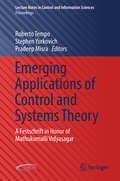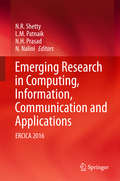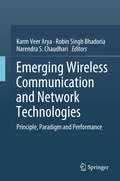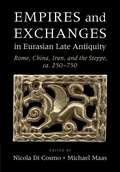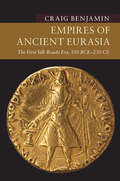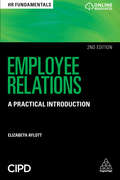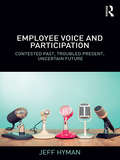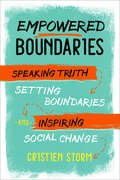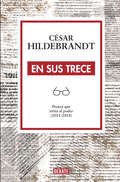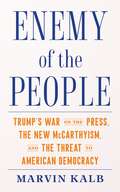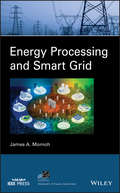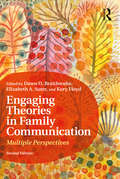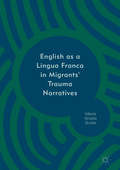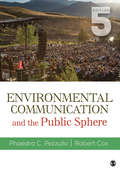- Table View
- List View
El informe Chinochet: Historia secreta de Alberto Fujimori en Chile
by Carlos Meléndez"¿Cómo explicar esta decisión aparentemente irracional de Alberto Fujimori de abandonar la cómoda protección japonesa para asumir las consecuencias de un escenario incierto?". Luego de una investigación paciente y rigurosa, el politólogo Carlos Meléndez logró develar uno de los misterios de la política peruana reciente: ¿por qué Fujimori dejó Japón, donde gozaba de cierta comodidad y considerable protección legal, para partir a Chile, de dónde finalmente sería extraditado? A través de fuentes, documentos enéditos y entrevistas personales con implicados directos, Meléndez logra narrar los entresijos de una estrategia que, hasta hoy, sigue teniendo consecuencias en la vida política peruana, y que marcó no solo el detino del fujimorismo como familia, sino también como partido político. Reseñas "Una lectura obligada para todos los interesados en derechos humanos, política bilateral y política pura, este texto es además informativo, entretenido e iluminador". Patricio Navia "Más que comprender la forma en que Pinochet y Fujimori rompieron el cauce democrático e instititucional en sus países y debieron enfrentar el juicio crítico de sus sociedades por sus abusos y delitos, Meléndez nos invita a imaginar lo que sería ese grifo mitológico llamado "Chinochet" y sobre todo sus crías del siglo XXI. Lea este libro como una novela y quizás su disfrute le haga sentirse menos culpable. Y darse cuenta de que también en los intersticios de la historia el Perú y Chile comparten una tragedia que va más allá de la guerra". Alejandro Neyra
El muro que ya existe
by Eileen TruaxDurante décadas ha operado una máquina anti inmigratoria del gobierno estadounidense en connivencia con el mexicano, cometiendo violaciones a los derechos humanos e incumpliendo los estatutos internacionales para brindar refugio. En un país que empezó teniendo perseguidos políticos desde el salinismo, hasta el masivo desplazamiento forzada a causa de las políticas de seguridad del calderonismo, Eileen Truax, expone a través de un reporteo altamente contextualizado, las historias de quienes huyen de manera desesperada y sin encontrar el cobijo legal, económico y social de su país de origen, ni en el que históricamente se ha comprometido ante el mundo.
El país que me tocó (Memorias)
by Enrique Santos CalderónMemorias de Enrique Santos Calderón uno de los referentes periodísticos en Colombia. Desde muy joven demostró una voluntad de independencia que, en los años sesenta, tomó vuelo con el ideario marxista, el rock y el hippismo. Primogénito de una de las familias más influyentes en la historia del país, Santos cuestionó el establecimiento desde adentro. Con su legendaria revista Alternativa marcó a toda una generación y con su columna "Contraescape" fue la voz más leída en uno de los momentos críticos de la política colombiana A sus setenta años, Enrique Santos evoca en sus memorias a quienes formaron su sensibilidad y pensamiento, los eventos que encauzaron su evolución política y periodística; recuerda a su familia, amigos y enemigos, y con su vida de fondo reflexiona sobre la Colombia de las últimas cinco décadas. Un libro rico en anécdotas y grandes personajes que registra el proceso vital de alguien que defendió la libertad en todas sus formas y que fue testigo privilegiado del país a veces fascinante, a veces frenético y violento, de la segunda mitad del siglo XX y el tránsito al XXI.
El secuestro de la justicia: Virtudes y problemas del sistema judicial
by Ignacio Escolar Joaquim Bosch Grau¿Está la justicia española secuestrada por los políticos? Joaquim Bosch (ex portavoz de Juezas y Jueces para la Democracia) e Ignacio Escolar (director de eldiario.es) han unido fuerzas para escribir un libro necesario, incisivo y pedagógico sobre la Justicia. El sistema judicial está en crisis. Así lo denuncia esta reflexión crítica sobre un deterioro que afecta profundamente a nuestra democracia. En una escalada sin precedentes, las injerencias políticas son muy visibles, se concentran en la cúpula judicial y son especialmente peligrosas en los casos de corrupción. Por otro lado, la ciudadanía percibe que las leyes no siempre son iguales para todos. Las maniobras que tratan de capturar las instituciones judiciales están relacionadas con un fenómeno más amplio: los intentos de secuestro de la Justicia como valor. Por eso los autores también estudian: las injusticias que padecen las víctimas de violencia machista, y los que padecen abusos bancarios; los problemas en la aplicación de la prisión provisional o los excesos en los límites de la política de penas de privación de libertad; el drama de los refugiados y la criminalización de los inmigrantes; la falta de reparación de las víctimas del franquismo; la actuación de la justicia en el conflicto catalán; y los crecientes recortes de libertades. Pero El secuestro de la Justicia es también una defensa de la magnífica base del sistema judicial, esa inmensa mayoría de magistrados que no se ha dejado contaminar. Como los que llevaron los abusos bancarios a la jurisdicción europea y vencieron. O los que, sin medios suficientes, investigan la corrupción y ponen contra las cuerdas a políticos y a empresarios. La crítica ha dicho...«Relato pedagógico sobre separación de poderes.»EFE «Un texto ensayístico, pero escrito con estilo periodístico, orientado a plantear una larga serie de reflexiones y dudas sobre el llamado tercer poder.»Juan Bolea, El Periódico de Aragón «Un libro fundamentalpara entender nuestro país. No solo recomendable, sino imprescindible.»Carlos Ávila, Andamios (y la vida sigue)
El tiempo detenido y otras historias de África
by Lola HierroPrólogo de Xavier AldekoaEpílogo de José Naranjo Una mirada fascinante al continente africano para descubrir vidas, culturas, tradiciones, sabores y olores, que invitan al lector a inventar su propia África. Gracias a su trabajo como reportera, Lola Hierro ha conocido la esperanza de igualdad de las mujeres en Etiopía; ha dormido junto a hipopótamos en Kenia; ha admirado el trabajo de las campesinas del mar en Tanzania; ha saboreado el café preparado a la manera tradicional en Uganda; ha sido alumna de la maestra Doussou Fané en Malí; ha sido testigo de las duras condiciones de vida de los refugiados en Níger; ha comprobado la resistencia de los bosquimanos en Botsuana; ha abrazado el mar y el desierto en Namibia, y ha sobrevivido a las indómitas aguas del río Zambeze en Zimbaue. Una invitación a viajar en un matatu particular y observar la forma de vida y los cambios que se producen en un vastísimo territorio en el que, en palabras de la autora, «el tiempo se detiene ante nuestros ojos, sí, pero como la noria que para un momento y permite que nos subamos antes de empezar a girar y llevarnos al cielo».
Electromagnetic Performance Analysis of Graded Dielectric Inhomogeneous Radomes (SpringerBriefs in Applied Sciences and Technology)
by Raveendranath U. Nair P. Mahima M. Suprava S. Vandana Mohammed P.S. YazeenThis book reports on a new radome wall configuration based on an inhomogeneous planar layer, which overcomes current fabrication constraints in radome design and yields improved electromagnetic (EM) characteristics. The book also includes a detailed description of radomes and antenna-radome interaction studies for different radome wall configurations. The radome wall was designed using the equivalent transmission line method (EQTLM), since it requires less computational speed and provides accurate results. In order to substantiate the accuracy of the results obtained using EQTLM, the simulated results based on full wave methods like CST Microwave Studio Suite are also included. The EM performance analysis of the antenna-radome system for two radome shapes, tangent ogive (for airborne applications) and hemispherical (for ground-based applications), was performed using Geometric Optics Method in conjunction with the Aperture Integration Method. To show the efficacy of the new design, a comparison of performance characteristics between the novel radome and conventional wall configurations is also included. Lastly, it presents antenna-radome interaction studies for various aperture distributions. The book offers a unique resource for all researchers working in the area of microwave radomes.
Elis: Internal Politics and External Policy in Ancient Greece (Cities of the Ancient World)
by Graeme BourkeElis examines the city of Elis from its earliest history, through the Archaic period and the Classical period where it reached its zenith, to its decline in the Hellenistic, Roman and later periods. Through examining this prominent city-state, its role in contemporary politics and the place of Olympia in its territory, Graeme Bourke allows the reader to explore broader issues, such as the relationship between the Spartans and their various allies, often collectively referred to as ‘the Peloponnesian League’, the connection between political structures and Panhellenic sanctuaries, and the network of relationships between various ancient sanctuaries throughout the Greek-speaking world. The volume, which makes available in English for the first time much of the debate about the city, provides a valuable resource for students and academics studying the city of Elis, the Peloponnese and the relationships within it, and pre-Hellenistic Greece as a whole.
Elite Discourse: The rhetorics of status, privilege and power
by Crispin Thurlow and Adam JaworskiElite Discourse examines how language and communication – or just discourse – define, mediate and legitimize class privilege. It does so from the perspective of those people and places who often stand to gain most from inequality. Collectively, chapters consider language and communication that is elitist in its appeal to distinction, excellence and superiority; they also describe the ways in which various groups and institutions lay claim to ‘eliteness’ as a way to position themselves (or to be positioned by others) as elite or non-elite. As such, chapters are concerned as much with discourse about elite status as they are with the discourse of elites – those groups commonly defined by their material wealth, political control, or demographic rarity. Ultimately, Elite Discourse views ‘elite’ as something we do, rather than something we necessarily have or are. Indeed, elite status and eliteness point us to the rhetorical strategies by which many people differentiate themselves and by which they access symbolic-material resources for shoring up their status, privilege and power. This book was originally published as a special issue of Social Semiotics.
Embodying Language in Action: The Artistry of Process Drama in Second Language Education
by Erika PiazzoliThis book explores embodiment in second language education, sociocultural theory and research. It focuses on process drama, an embodied approach that engages learners’ imagination, body and voice to create a felt-experience of the second language and culture. Divided into three parts, it begins by examining the aesthetic and intercultural dimension of performative language teaching, the elements of drama and knowing-in-action. The central part of the book examines issues related to play, emotions, classroom discourse and assessment when learning a language through process drama, in a sociocultural perspective. The third part is an analysis of the author’s qualitative research, which informs a subtle discussion on reflective practitioner methodology, learner engagement and teacher artistry. Each chapter includes a drama workshop, illustrating in practice what embodying language in action can look like when working with asylum seekers, adult learners with intellectual disabilities, pre-service teachers, international students and children involved in a Content and Language Integrated Learning (CLIL) programme. A unique combination of theory, research and reflective practice, this book provides valuable insights for teacher/artists, teacher educators and researchers in the fields of performative and sociocultural language learning.
Emerging Applications of Control and Systems Theory: A Festschrift In Honor Of Mathukumalli Vidyasagar (Lecture Notes In Control And Information Sciences - Proceedings Ser.)
by Roberto Tempo Stephen Yurkovich Pradeep MisraThis book celebrates Professor Mathukumalli Vidyasagar’s outstanding achievements in systems, control, robotics, statistical learning, computational biology, and allied areas. The contributions in the book summarize the content of invited lectures given at the workshop “Emerging Applications of Control and Systems Theory” (EACST17) held at the University of Texas at Dallas in late September 2017 in honor of Professor Vidyasagar’s seventieth birthday. These contributions are the work of twenty-eight distinguished speakers from eight countries and are related to Professor Vidyasagar’s areas of research. This Festschrift volume will remain as a permanent scientific record of this event.
Emerging Research in Computing, Information, Communication and Applications
by N. R. Shetty N. H. Prasad N. Nalini L. M. PatnaikThis book presents the proceedings of International Conference on Emerging Research in Computing, Information, Communication and Applications, ERCICA 2016. ERCICA provides an interdisciplinary forum for researchers, professional engineers and scientists, educators, and technologists to discuss, debate and promote research and technology in the upcoming areas of computing, information, communication and their applications. The book discusses these emerging research areas, providing a valuable resource for researchers and practicing engineers alike.
Emerging Wireless Communication and Network Technologies: Principle, Paradigm and Performance
by Robin Singh Bhadoria Karm Veer Arya Narendra S. ChaudhariThe book covers a wide range of wireless communication and network technologies, and will help readers understand the role of wireless technologies in applications touching on various spheres of human life, e.g. healthcare, agriculture, building smart cities, forecasting and the manufacturing industry.The book begins by discussing advances in wireless communication, including emerging trends and research directions for network technologies. It also highlights the importance of and need to actively develop these technologies. In turn, the book addresses different algorithms and methodologies which could be beneficial in implementing 5G Mobile Communication, Vehicular Ad-hoc Networks (VANET), Reliable Cooperative Networks, Delay Tolerant Networks (DTN) and many more contexts related to advanced communications. It then addresses the prominence of wireless communication in connection with the Internet of Things (IoT), Mobile Opportunistic Networks and Cognitive Radio Networks (CRN). Lastly, it presents the new horizons in architecture and building protocols for Li-Fi (Light-Fidelity) and Wearable Sensor Technology.
Empires and Exchanges in Eurasian Late Antiquity: Rome, China, Iran, And The Steppe, Ca. 250-750
by Michael Maas Nicola Di CosmoEmpires and Exchanges in Eurasian Late Antiquity offers an integrated picture of Rome, China, Iran, and the Steppes during a formative period of world history. <P><P>In the half millennium between 250 and 750 CE, settled empires underwent deep structural changes, while various nomadic peoples of the steppes (Huns, Avars, Turks, and others) experienced significant interactions and movements that changed their societies, cultures, and economies. <P>This was a transformational era, a time when Roman, Persian, and Chinese monarchs were mutually aware of court practices, and when Christians and Buddhists criss-crossed the Eurasian lands together with merchants and armies. It was a time of greater circulation of ideas as well as material goods. <P>This volume provides a conceptual frame for locating these developments in the same space and time. Without arguing for uniformity, it illuminates the interconnections and networks that tied countless local cultural expressions to far-reaching inter-regional ones.<P> Proposes an integrated view of Eurasia during the period ca.250–750 CE that brings together Rome, China, Iran, and the central steppe lands, allowing readers to gain a fresh approach to a coherent transformational period in world history that has not been discussed within these chronological and geographical parameters before.<P> Brings together in an innovative way two areas that are the focus of considerable current interest, late antique studies and silk road studies, offering new methodologies for integrated study.<P> Introduces the concept of 'Eurasian Late Antiquity', which is not based on the centrality of the Roman Mediterranean world, helping readers understand the commonalities, differences, and exchanges over a broad geographic area, including Rome, China, Iran, and the steppe lands between them.
Empires of Ancient Eurasia: The First Silk Roads Era, 100 BCE - 250 CE (New Approaches To Asian History)
by Craig BenjaminThe Silk Roads are the symbol of the interconnectedness of ancient Eurasian civilizations. Using challenging land and maritime routes, merchants and adventurers, diplomats and missionaries, sailors and soldiers, and camels, horses and ships, carried their commodities, ideas, languages and pathogens enormous distances across Eurasia. The result was an underlying unity that traveled the length of the routes, and which is preserved to this day, expressed in common technologies, artistic styles, cultures and religions, and even disease and immunity patterns. <P><P>In words and images, Craig Benjamin explores the processes that allowed for the comingling of so many goods, ideas, and diseases around a geographical hub deep in central Eurasia. He argues that the first Silk Roads era was the catalyst for an extraordinary increase in the complexity of human relationships and collective learning, a complexity that helped drive our species inexorably along a path towards modernity.<P> The first accessible single-volume history of all of ancient Eurasia, offering an account of the major sedentary and nomadic states and empires of the region.<P> Conceptualizes the Silk Roads within big history, world-systems, and ancient globalizations to connect history and theory.<P> Offers a fresh approach to understanding historical developments in the ancient world.
Employee Relations: A Practical Introduction (HR Fundamentals #2)
by Elizabeth AylottFostering positive relationships between employers and employees is crucial to ensure employee commitment and engagement, as well as overall business performance. Employee Relations is a practical guide to the principles and practice of employee relations in the workplace. Covering the key areas such as conflict and dispute resolution, dismissal and redundancies, rights and ethics, it equips you with the skills and knowledge you need to plan, implement and assess employee relations in any type of organization. Practical diagnostic tools and a variety of real-life examples from organizations including Amazon, HSBC and the UK Police Force are found throughout. This fully revised second edition of Employee Relations features new material on the gig economy, the virtual workplace, and recent legislation changes, and is more closely linked to the CIPD professions map. New online supporting resources include a series of templates, questionnaires and further tools to help evaluate and support the development of an effective employee relations strategy.HR Fundamentals is a series of succinct, practical guides for students and those in the early stages of their HR careers. They are endorsed by the Chartered Institute of Personnel and Development (CIPD), the UK professional body for HR and people development, which has over 145,000 members worldwide.
Employee Voice and Participation: Contested Past, Troubled Present, Uncertain Future
by Jeff HymanEmployee participation and voice (EPV) concern power and influence. Traditionally, EPV has encompassed worker attempts to wrest control from employers through radical societal transformation or to share control through collective regulation by trade unions. This book offers a controversial alternative arguing that, in recent years, participation has shifted direction. In Employee Voice and Participation, the author contends that participation has moved away from employee attempts to secure autonomy and influence over organisational affairs, to one in which management ideas and initiatives have taken centre stage. This shift has been bolstered in the UK and USA by economic policies that treat regulation as an obstacle to competitive performance. Through an examination of the development of ideas and practice surrounding employee voice and participation, this volume tracks the story from the earliest attempts at securing worker control, through to the rise of trade unions, and today’s managerial efforts to contain union influence. It also explores the negative consequences of these changes and, though the outlook is pessimistic, considers possible approaches to address the growing power imbalance between employers and workers. Employee Voice and Participation will be an excellent supplementary text for advanced students of employment relations and Human Resource Management (HRM). It will also be a valuable read for researchers, policy makers, trade unions and HRM professionals.
Empowered Boundaries: Speaking Truth, Setting Boundaries, and Inspiring Social Change
by Cristien StormStrengthen relationships, build more resilient communities, and develop a stronger emotional toolbox Explaining power and privilege and the links between individual safety and community safety, Cristien Storm shows readers how to set emotional boundaries that build vibrant social movements and a better world for all. As there have been increases in violence against women, people of color, immigrants, and LGBTQI-identified people, there has been a corresponding demand for individual and community self-defense, boundary setting, and bystander trainings. Boundary setting can be used not just as a means for personal safety but as form of solidarity, resistance, and inspiration.From saying no to a boss who always asks you to work late, to setting a boundary with a loved one, to navigating an uncomfortable situation at the bus stop, Cristien Storm offers a new approach to verbal boundary setting that is accessible for all bodies and identities. Practical in scope, the book includes tools, tips, and strategies from Storm's decades of experience leading boundary-setting workshops. Grounded in resiliency and trauma-informed theory, Storm pays particular attention to the experiences of women, people of color, immigrants, and LQBTQI-identified people, making this necessary reading for anyone looking to create healthier relationships and build stronger communities.
En sus trece: Prensa que irrita al poder (2011-2018)
by César Hildebrandt"Porque el periodismo es eso: tensar la cuerda, retar, obtener, tras arduos trabajos, la enemistad de los que cortan el jamón, los muchachos del big money. A mí que no me vengan con prensa sedante, prensa láudano, chicharrón de prensa, mustios collados. Solo la prensa que irrita al poder se salva de envolver pescado." De los muchos textos escritos en estos años para el semanario que lleva mi nombre -groserías del márqueting, demandas de la subsistencia-, pocos son los que resultan legibles con el paso del tiempo. La mayor parte perece en la fugacidad, en el chisporreo grasiento de lo banal. Ahora los leo y me doy cuenta de cuánto reincido en temas y obsesiones. El menú de mi neurosis podría abreviarse de esta manera: me disgusta el mundo tanto como antes, cuando era joven y creía que lo cambiaríamos. Los consejos de la edad no me han servido de nada. Sigo siendo paciente de la ira y está intacto, más lozano si cabe, mi amor por las causas perdidas. Vivo en un país que amo y me abate al mismo tiempo, y he visto caer a casi todos los dioses que fueron el hechizo olimpo de mi juventud. Pero eso no me ha conducido a la melancolía, felizmente. Cada día estoy más convencido de que mi deber es pelear por lo que creo. ¿Creer? Sí, por qué no. No está mal creer que algún día el mundo será verde y que el Perú admitirá el placer de la civilización. No está mal creer que el mundo se deshará de los políticos y reconocerá, a la fuerza, que el planeta merece mejores guías y más ciertos discursos. En el fondo, esa es la pelea. Contra lo que muchos creen, no venero el pesimismo. Admito que el Perú alienta todas las tristezas y los desalientos, pero jamás me entregué al lujo de los años sabáticos y las treguas clínicas. La peor desgracia del Perú son sus políticos. Y eso es algo que hemos permitido los peruanos. No fue el imperialismo el que nos impuso a Fujimori ni vinieron de fuera los alisios viciosos que nos han hecho renunciar, tantas veces, a la dignididad ciudadana. No es de extrañar que buena parte de de estos textos estén dirigidos al denuesto altisonante de quienes asumieron el poder y nos defraudaron. César Hildebrandt
Enemy of the People: Trump's War on the Press, the New McCarthyism, and the Threat to American Democracy
by Marvin Kalb[from inside flaps] ""The FAKE NEWS media is not my enemy, it is the enemy of the American People!" President Trump tweeted this declaration less than a month after his inauguration. Attacks on the media have been a hallmark of his presidential campaign and style of governance. This represents a dangerous and dramatic turning point. Twentieth-century dictators--Stalin, Hitler, and Mao--all denounced their critics, especially the press, as "enemies of the people." Their goal was to delegitimize the work of the press--effectively calling it "fake news," thereby creating confusion in the public's mind about what's real and what isn't, what can be trusted and what can't be. This also appears to be Trump's goal. In Enemy of the People, Marvin Kalb, an award-winning American journalist, writes with passion about his concerns for the future of American democracy. Can it withstand Trump's unrelenting attacks on the press? As Kalb shows, the press has been a bulwark of American democracy. He writes about Edward R. Murrow's courageous broadcasts that turned the cold light of reality on Senator Joseph McCarthy's "Red Scare" threats in the early 1950s. He also vividly reminds us of Bob Woodward and Carl Bernstein's reporting during the Watergate scandal, which led to President Richard Nixon's resignation. Without a fearless, robust press, democracy is in peril. Kalb's book is an eye-opening indictment of President Trump's efforts to debase and dehumanize the American media--and put the future of America's democracy in question."
Energy Processing and Smart Grid (IEEE Press Series on Power Engineering)
by James A. MomohThe first book in the field to incorporate fundamentals of energy systems and their applications to smart grid, along with advanced topics in modeling and control This book provides an overview of how multiple sources and loads are connected via power electronic devices. Issues of storage technologies are discussed, and a comparison summary is given to facilitate the design and selection of storage types. The need for real-time measurement and controls are pertinent in future grid, and this book dedicates several chapters to real-time measurements such as PMU, smart meters, communication scheme, and protocol and standards for processing and controls of energy options. Organized into nine sections, Energy Processing for the Smart Grid gives an introduction to the energy processing concepts/topics needed by students in electrical engineering or non-electrical engineering who need to work in areas of future grid development. It covers such modern topics as renewable energy, storage technologies, inverter and converter, power electronics, and metering and control for microgrid systems. In addition, this text: Provides the interface between the classical machines courses with current trends in energy processing and smart grid Details an understanding of three-phase networks, which is needed to determine voltages, currents, and power from source to sink under different load models and network configurations Introduces different energy sources including renewable and non-renewable energy resources with appropriate modeling characteristics and performance measures Covers the conversion and processing of these resources to meet different DC and AC load requirements Provides an overview and a case study of how multiple sources and loads are connected via power electronic devices Benefits most policy makers, students and manufacturing and practicing engineers, given the new trends in energy revolution and the desire to reduce carbon output Energy Processing for the Smart Grid is a helpful text for undergraduates and first year graduate students in a typical engineering program who have already taken network analysis and electromagnetic courses.
Engaging Communication
by Cheri J. Simonds Stephen K. Hunt Brent K. SimondsEngaging Communication is a brief yet substantive guide to becoming a critical consumer and producer of information. With an emphasis on media- and information-literacy, Engaging Communication supports students in becoming more competent, confident, and ethical communicators through chapters focused on foundational communication principles, crafting constructing clear messages, responding and listening, and communicating persuasively.
Engaging Theories in Family Communication: Multiple Perspectives
by Dawn O. Braithwaite Kory Floyd Elizabeth A. SuterEngaging Theories in Family Communication, Second Edition delves deeply into the key theories in family communication, focusing on theories originating both within the communication discipline and in allied disciplines. Contributors write in their specific areas of expertise, resulting in an exceptional resource for scholars and students alike, who seek to understand theories spanning myriad topics, perspectives, and approaches. Designed for advanced undergraduate and graduate students studying family communication, this text is also relevant for scholars and students of personal relationships, interpersonal communication, and family studies. This second edition includes 16 new theories and an updated study of the state of family communication. Each chapter follows a common pattern for easy comparison between theories.
English as a Lingua Franca in Migrants' Trauma Narratives
by Maria Grazia GuidoThis book examines how trauma is experienced and narrated differently across languages and cultures, drawing on rich ethnographic case studies and a novel cognitive-linguistic approach to analyse the variations of English as a Lingua Franca (ELF) used in the narratives of West-African migrants and refugees in the course of intercultural encounters with Italian experts from domain-specific fields of discourse (including legal, medical, religious and cultural professionals). It examines the ways in which such experts interpret the migrants’ trauma narratives by applying discourse conventions from within their communities of practice, as well as their own native linguacultural norms. It argues persuasively for the development of a ‘hybrid ELF mode’ of intercultural communication to be used by experts in charge of unequal encounters in specialized migration contexts that can accommodate different culture-bound categorizations of trauma. This timely and important work will appeal in particular to students and scholars of applied linguistics, discourse analysis, cognitive linguistics, intercultural communication, pragmalinguistics, migration studies and healthcare communication.
Environmental Communication and the Public Sphere: Cox: Environmental Communication And The Public Sphere 4e + Clarke: Environmental Communication Management
by Dr Phaedra C. Pezzullo Robert CoxThe Fifth Edition of the award-winning Environmental Communication and the Public Sphere is the first comprehensive introduction to the growing field of environmental communication. This groundbreaking book focuses on the role that human communication plays in influencing the ways we perceive the environment. It also examines how we define what constitutes an environmental problem and how we decide what actions to take concerning the natural world. The updated and revised Fifth Edition includes recent developments, such as water protectors and the Dakota Access Pipeline, the Flint Water Crisis, and the March for Science, along with the latest research and developments in environmental communication.
Environmental Communication and the Public Sphere: Cox: Environmental Communication And The Public Sphere 4e + Clarke: Environmental Communication Management
by Dr Phaedra C. Pezzullo Robert CoxThe Fifth Edition of the award-winning Environmental Communication and the Public Sphere is the first comprehensive introduction to the growing field of environmental communication. This groundbreaking book focuses on the role that human communication plays in influencing the ways we perceive the environment. It also examines how we define what constitutes an environmental problem and how we decide what actions to take concerning the natural world. The updated and revised Fifth Edition includes recent developments, such as water protectors and the Dakota Access Pipeline, the Flint Water Crisis, and the March for Science, along with the latest research and developments in environmental communication.
